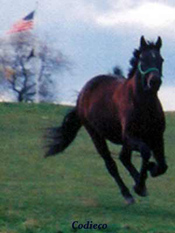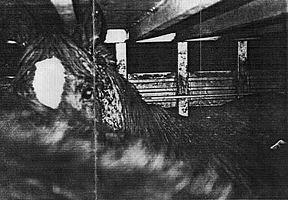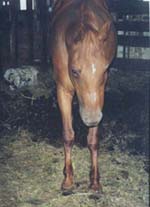
Legislation Information
Pending Legislation
PA's Electronic Bill Room
Type in the word "equine" in the search box to locate bills, (proposed legislation) relating to horses.
Federal Laws
Proposed regs will legalize every inhumane practice identified in the transport of horses to slaughter!

Doubles will be legal for 5 years AFTER the proposed regs go into effect. It has already been 4 1/2 years, that makes for 10 years of the continued use of doubles after this legislation passed..
EPN's Comments
on Proposed Regulations For the 1996 Commercial Transportation of Horses To Slaughter Act
CA Equine Council's
Comments on the Proposed Regulations For the 1996 Commercial Transportation of Horses To Slaughter Act
State Laws
Proposition 6,
The PROHIBITION of Horse Slaughter and Sale of Horsemeat for Human Consumption Act Of 1998, Does Not Violate The Commerce Clause
Horsemeat Laws
1996 Commercial Transportation Of Horses To Slaughter Act
December 7, 2001
Final Rule Commercial Transportation of Horses to Slaughter Act
American Horse Council, American Horse Protection Association, & Humane Society of US
propose to legalize every inhumane practice identified in the transport of horses to slaughter & put the very people identified as the abusers, the "killer buyers" in charge of the horses!
Proposed Regulations For the 1996 Commercial Transportation of Horses To Slaughter Act
USDA Animal & Plant Health Inspection Service, APHIS
Approval of Livestock Facilities;
Interstate Movement of EIA Reactors
USDA Food Safety Inspection Service, FSIS, Regulations
Biological Residues in Horses;
Slaughter of Foaling Mares;
Slaughter of Sick Horses;
USDA APHIS Humane Slaughter Act

AZ Transport Law
CA Transport Law
CT Transport Law
MA Transport Law
MN Transport Law
NY Transport Law
Ag and Markets, Section 359-a

Horses inside double deck cattle trailer stopped by the NYSP. The owner was later convicted & fined $3000.00.
VA Transport Law
Vermont Transport Law
PA Anti Cruelty Law
Title 18, Section 5511
Sign Posted at PA Horse Auctions is NOT the Law!
Sign outside auctions is incorrect!

Sign posted outside 2 PA horse auctions regarding the PA Anti Cruelty Statute is incorrect! " Maybe the posting of this sign has something to do with "the agreement" that the auctions and the PA SPCA have with each other...
U.S. Anti-Cruelty Statutes
PA Domestic Animal Act
Licensing of Dealers & Haulers
EIA Regulations, Coggins Test
PA Dead Animal Act
Requirements for Removal of Dead Animals
PA Animal Markets
General Provisions
Records
Transactions From Trucks
IL Horsemeat Act
Texas Law
Sale of Horsemeat for Human Consumption
Prohibits Sale of Horsemeat For Human Consumption
Texas Attorney General Cornyn States TX Law
Prohibiting Sale of Horsemeat Applies to the 2 Texas Horse Slaughterhouses!
Links
California Voters "Just Say Neigh" to Horse Slaughter!
HoofPAC
Shop online at IGive.com with over 400 great stores you know & love- including Back In the Saddle! Up to 26% of the purchase price is donated to the EPN!
The EPN gets $5 extra the first time you shop!
PayPal accepts credit cards! Please send your tax deductible donation to the:Equine Protection Network, Inc.,
P. O. Box 232, Friedensburg, PA, 17933.
Shop for CD's at CDRush.com & the EPN Benefits!
Put "EPN" in the Coupon Code box when you place your order.
Now you can save money on your favorite music and help the horses at the same time!
HoofPAC is the political action committee that has been formed to end the slaughter of America's horses. Cathleen Doyle, founder of HoofPAC, led the successful Save The Horses campaign in 1998 that made the slaughter of California's horses a felony.

PA Code Title 7 Chapter 3
Subchapter D. Importation Of Horses, Mules, Asses and Other Equidae
Interstate Health Certificate
3.101. Interstate health certificate required.
Equine Infectious Anemia
3.102. Dangerous transmissible disease.
3.103. Test methods.
3.104. Import for slaughtering purposes.
3.105. Equidae imported from quarantined areas; permit required.
Subchapter M. Intrastate Transportation Of Horses and Other Equidae
3.211. Diseased equidae; permit required.
3.215. Fairs, shows and sales.
3.221. Equine infectious anemia.
INTERSTATE HEALTH CERTIFICATE
§ 3.101. Interstate health certificate required.
(a) An approved interstate health certificate is required for equidae imported into this Commonwealth. The certificate shall be issued within 30 days of date of arrival in the Commonwealth. The certificate shall specify the results of tests conducted, along with the date of administration of the tests and the product used for vaccines administered.
(b) A copy of the certificate shall be forwarded to the Department immediately upon approval by the chief animal official of the state of origin.
Source
The provisions of this § 3.101 amended April 11, 1975, effective April 12, 1975, 5 Pa.B. 895; amended August 16, 1991, effective August 17, 1991, 21 Pa.B. 3688. Immediately preceding text appears at serial page (144176).
Cross References
This section cited in 7 Pa. Code § 5.51 (relating to entry of equidae into this Commonwealth).
Equine Infectious Anemia
§ 3.102. Dangerous transmissible disease.
Equine infectious anemia, commonly known as ‘‘swamp fever,’’ and caused by a virus which is infectious in nature, is hereby considered by the Department to be a dangerous transmissible disease.
§ 3.103. Test methods.
(a) Testing required. Equidae imported into this Commonwealth for other than immediate slaughter shall be negative to either of the following:
(1) An official agar gel immunodiffusion blood test (commonly called the Coggins Test), conducted by a Federally approved laboratory within 12 months prior to date of entry.
(2) An enzyme-linked immunosorbent assay test (commonly called the ELISA Test), conducted by a Federally approved laboratory within 12 months prior to date of entry.
(b) Documentation required. A copy of the official test shall accompany the animal to its final destination.
(c) Inconsistent results. If an equid receives more than one of the tests described in subsection (a), and one test shows a negative result and another a positive result, the equid may not be imported into this Commonwealth unless permission is granted by the Pennsylvania State Veterinarian.
(1) A person seeking permission shall do so in writing on a form provided by the Department setting forth the test dates, results of the tests and any other pertinent information.
(2) The Pennsylvania State Veterinarian may request additional information as may be necessary to assure the health of the animal and to prevent and control diseases and dangerous substances that may threaten the health and safety of animals and humans.
(3) The Pennsylvania State Veterinarian will provide a written approval or denial of a request within 3 working days of receiving the written request and all necessary information pertaining thereto.
(d) Exception. Foals under 6 months of age, accompanied by dam with negative agar gel immunodiffusion test or a negative enzyme-linked immunosorbent assay test do not require a negative test.
Authority
The provisions of this § 3.103 amended under the Domestic Animal Law, 3 Pa.C.S. § § 2302, 2305, 2321, 2323, 2325 and 2329.
Source
The provisions of this § 3.103 adopted April 11, 1975, effective April 12, 1975, 5 Pa.B. 895; amended December 1, 2000, effective December 2, 2000, 30 Pa.B. 6187. Immediately preceding text appears at serial pages (228036) to (228037).
Cross References
This section cited in 7 Pa. Code § 5.51 (relating to entry of equidae into this Commonwealth).§ 3.104. Import for slaughtering purposes.
Equidae imported for slaughter shall be consigned to a horse slaughter establishment or to an animal market. They shall be accompanied by either a waybill or an owner or shipper statement listing the number, description and destination of each animal.
§ 3.105. Equidae imported from quarantined areas; permit required.
A permit issued by the Department is required before importing equidae from a state or area wherein a state orFederal quarantine is invoked to prevent the spread of a contagious or infectious disease of equidae. Requirements for interstate health certificates in § 3.3 (relating to requirements for importation).
Subchapter M.
Intrastate Transportation Of Horses and Other Equidae
§ 3.211. Diseased equidae; permit required.
An equidae showing clinical or laboratory evidence of a disease declared dangerous and transmissible by the Department may not be moved except when accompanied by a permit issued by the Department or USDA-APHIS.
§ 3.215. Fairs, shows and sales.
(a) Commonwealth equidae moving intrastate to Commonwealth fairs, shows and sales are subject to the health requirements of the individual fair, show or sale.
(b) Equidae which are consigned to Commonwealth fairs, shows or sales will not be approved to move in interstate traffic until the requirements of the state of destination have been met.
§ 3.221. Equine infectious anemia.
(a) Test requirements. A test for equine infectious anemia is not required for intrastate movement of equidae unless required by individual race tracks, fairs, shows or sales.
(b) Official test. The official test for equine infectious anemia recognized by the Commonwealth is the agar gel immunodiffusion blood test (Coggins Test) conducted by a laboratory approved by USDA-APHIS or the Department, on blood samples collected by an accredited veterinarian. Only Antigen licensed by the USDA-APHIS shall be used for the Coggins test.
(c) Report of test results. Tests for equine infectious anemia shall be reported to the Department. Tests conducted in an approved laboratory within this Commonwealth shall be reported on official forms furnished for this purpose. Approved laboratories outside this Commonwealth conducting tests for Commonwealth owners shall report results promptly to the Department.
(d) Report of disease. A person having knowledge of the existence of equine infectious anemia or knowledge of an animal afflicted thereby anywhere within this Commonwealth shall immediately send a report of the infections to the Department, giving the name and address of the owner or person in charge of the animal and the place where the animal is kept.
(e) Identification of reactors. Equidae which disclose a positive reaction to the Coggins test shall be identified to a representative of the Department. A positive animal 8 months of age or younger shall be quarantined and retested after 9 months of age, and, if positive at that time, shall be classified as a reactor. Equidae 9 months of age or older tested positive shall be considered reactors.
(f) Reactors retested by Department: branding. An equidae reported as a reactor will be identified and retested by the Department. The Department will identify the tested animal by the use of mane/tail and other identifying marks or tags that are in evidence at the time of the test. If the result of the retest by the Department is positive, the Department will identify the positive retested animal with a brand marked ‘‘23A’’ signifying the animal as a reactor. It is unlawful to remove, deface, alter or otherwise change the tag or brand.
(g) Clinical evidence-epidemiological investigation. Should the reactor equidae show clinical evidence of equine infectious anemia or if an epidemiological investigation so indicates, equidae on the premises where the clinical reactor is found shall be quarantined and movement allowed only after a negative test of the remainder of the animals on the premises at the time the positive animal is disclosed. A cost of $3 per animal tested will be charged for cost of test—all tests conducted at the Summerdale laboratory. Samples shall be submitted by an accredited veterinarian, who shall be responsible for the $3 fee.
(h) Quarantine. An equidae infected with equine infectious anemia shall be quarantined on its home farm, or other premises approved by the Department, for the remainder of the horse’s life. The Department may authorize the movement of an infected animal to approved facilities for research or for slaughter. The infected animal shall be segregated from all others in approved isolation facilities, or, at the discretion of the owner, destroyed without indemnity. Isolated quarantine facilities and animals located therein shall be treated with an approved pesticide as directed by the Department.
(i) Movement into quarantine facilities. Equidae shall be moved into quarantined isolation facilities with a special permit under conditions approved by the Department. The animals assume the same status as animals under quarantine.
(j) Movement from quarantine facilities. Foals born in quarantined facilities and found negative prior to reaching 9 months of age may be removed to a new noninfected premises. The foals shall be retested not less than 30 days following removal from the original infected premises or quarantine facility. Other equidae not infected which are located on premises where infected animals are properly quarantined in isolation are not considered to be under quarantine and may be moved from the premises intrastate.
Source
The provisions of this § 3.221 adopted April 11, 1975, effective April 12, 1975, 5 Pa.B. 895; amended January 27, 1978, effective January 28, 1978, 8 Pa.B. 246; amended August 16, 1991, effective August 17, 1991, 21 Pa.B. 3688. Immediately preceding text appears at serial pages (144205) to (144206) and (144957).
NOTE:
- Is Being Held At An Animal Auction, Kept In Contact with Other Equines that are NOT For SLAUGHTER, Considered Immediate Slaughter?
- Quarantined?
- Are Postive Reactors Held at An Animal Auction with the General Horse Population, Considered Quarantined?
- Being Shipped Directly to Slaughter?
- Are Horses Sold in Another State without Coggins Tests, (Because the Horses were being Shipped Directly to Slaughter), Considered in Quarantine when Held at a PA Auction with other Horses?
- Being Shipped Directly to Slaughter?
- Layed over for Food, Water & Rest when NONE is Available?
Save America's Horses! |
|||||||
|
Please send your tax deductible donation to: Equine Protection Network, Inc., P. O. Box 232, Friedensburg, PA, 17933 |
||
Save America's Horses- Make the Commitment to Your Horse! |
||
|
Photos On This Page CANNOT be Used Without Written Permission
|
||


